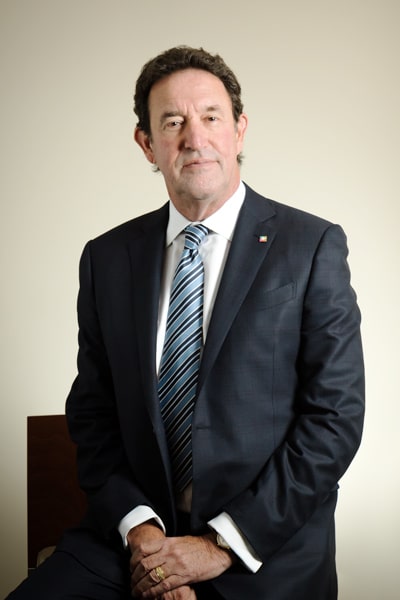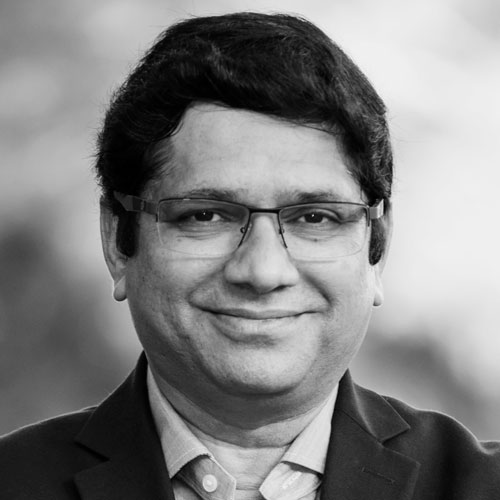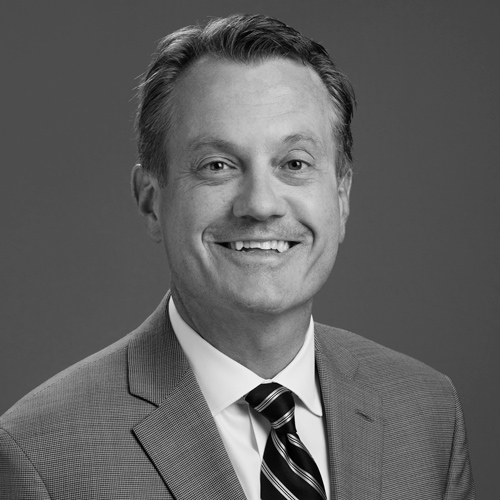Elliot Joseph had walked through the front doors of Hartford HealthCare’s flagship hospital and exited its fifth floor elevator more times than he could recall. But the sign marking Hartford Hospital’s Cancer Center looked much different to the organization’s CEO on the day he was entering as a patient in 2009.
“I read that sign and broke down,” recalls Joseph, who was walking with his wife by his side to be admitted for a thirty-day stay. “I started to cry, and all the emotions I had been holding in until that moment came out.”
During his admission, Joseph was successfully treated for leukemia, an experience that has further shaped his approach as a leading healthcare executive.
“For me, what that turned into—thanks to a lot of good fortune—was a deeper appreciation for the emotional journey of patients, families, and staff members,” Joseph says. “That is really the core of what we do. I thought I understood before I had that experience, but I really didn’t, and I think it’s informed how I have thought about things going forward.”

Being a patient also reinforced the idea that physical and emotional well-being is integrally connected for both those being treated and those administering the care. And although the transformation has been slower in the healthcare industry than for its leader, Hartford HealthCare is implementing a more integrated approach to treatment that addresses patients holistically.
“This is truly a transformative stage in healthcare in this country—a generational change,” he says. “To have that transformation, behaviors, processes, and structures have to change. But I’m a believer in the importance of language to facilitate change in behaviors and, ultimately, outcomes.”
At Hartford HealthCare, the modern metamorphosis has now involved changing the corporate culture, technology, and even the language clinicians and other staff members use. Rather than being “discharged” from acute care after a hospital stay, Hartford’s “customers”—a term Joseph says is a better fit considering healthcare’s rising out-of-pocket costs—transition to other settings. That journey may include physical therapy, home care, and other services.
“There’s really nothing good about the word ‘discharge’ in almost any of its meanings,” Joseph says. “And yet, as an industry, we’ve become very comfortable with the concept of discharging people.”
The term is an especially ill fit at Hartford, which in addition to operating hospitals, has become Connecticut’s largest provider of behavioral services and home care, as well as offers an assortment of other services on both an inpatient and outpatient basis. Joseph’s mission is to have Hartford be viewed as a community provider that offers an integrated continuum of care well beyond hospital walls. But integration is a tall order for what has long been largely a cottage industry of individual providers. Joseph says that’s especially true for those in the community who are most ill, who often see as many as a dozen doctors to help them manage multiple health issues and prescriptions that could number in the forties or fifties.
“They are trying to traverse a system that wasn’t built to care for people with multiple chronic diseases, so they experience tremendous lack of coordination, repeated emergency room visits, and repeated hospital admissions, many of which would be unnecessary in a system built around them and their needs,” Joseph explains.
In fact, Joseph believes repairing the healthcare system to improve integration and transparency would boost affordability, access, and positive clinical outcomes for all users. Technology will be one of the cornerstones of the renovation at Hartford, which recently inked a seven-year partnership with GE Healthcare to implement a variety of initiatives to reduce patient wait times and improve communication and coordination between providers, among other benefits.
One example entails using GE’s expertise in predictive analytics to determine where to deploy specific medical equipment so that providers and patients receive it when they need it most—similar to how retailers stock up on rock salt before a snowstorm. Likewise, Joseph wants to take a cue from consumer companies that have built a strong brand identity that customers recognize and respect.
“We want to create a meaningful difference for those served, where you will feel a sense of our brand in our language and our behaviors in a way that makes you look at us as most trusted for personally coordinating your care,” Joseph says.
As part of that effort, Hartford recently introduced an online employee feedback and recognition system that its eighteen thousand staff members have access to every day. With this system in place, employees can provide information that executives can review weekly to address issues that may be contributing to burnout or other factors that could impact the health and happiness of Hartford staffers and those they serve. The healthcare system also brought on a chief experience officer to help reinforce its culture and values. Such moves represent somewhat of a sea change for an industry, where the primary focus has never been on coordination, cost savings, or customer service, per se.
And there may be no better person to captain that ship than Joseph, who often found himself in turbulent waters during his school days for always asking “why?”
“For better or worse, I was born a rebel, a questioner of authority,” says the native New Yorker. “So I never saw myself as the leader of an organization, so to speak. But I feel blessed to be here and be here now in the midst of an evolution in the industry. I have had a really stimulating and exciting career up until now, and it’s been built primarily on asking ‘why?’”
Joseph’s unconventional executive ethos even extends to his taste in music. He points to the last verse of the Grateful Dead song “Ripple” as something that bolsters his resolve and sense of purpose as a leader. It reads:
You who choose to lead must follow
But if you fall, you fall alone
If you should stand, then who’s to guide you?
“It also reminds me that, if I lead, I have to follow. I have to create engagement and listen to others,” Joseph says. “At the end of the day, there are few management books I’ve read that are more insightful to me than those lines of that song. This philosophy has served me well, especially relevant during a period of major transformation.”
Photo: Chris Rakoczy


